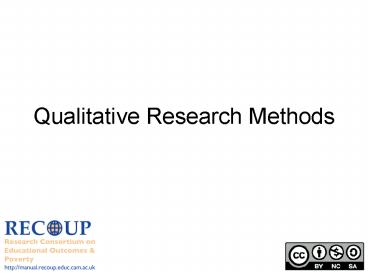Qualitative Research Methods - PowerPoint PPT Presentation
1 / 13
Title: Qualitative Research Methods
1
Qualitative Research Methods
2
What is qualitative research?
- Research that
- focuses on how individuals and groups view and
understand the world and construct meaning out of
their experiences. - focuses on the understanding of research
phenomena in situ, within their
naturally-occurring context(s). - teases out the meaning(s) the phenomena have for
the actors or participants. - Aims to understand the processes (e.g. why and
how and which decisions are made) rather than
just the outcomes (e.g. dropping-out of school or
not).
3
Three basic data gathering techniques
- Participant observation, or ethnographic
fieldwork - Interviewsindividual or group
- Content analysis of social artefacts (usually
documents, but also photographs) - Each of these can be carried out in more or less
structured and more or less participatory ways
4
What methods are available for use in qualitative
research?
- Case studies
- Focus groups
- In-depth interviews
- Semi-unstructured or unstructured interviews
- Life histories, oral history
- Community mapping, time-lines
- Observation, fieldwork
- Diaries, other personal documents
- Time-use studies
- Life-line analysis
5
Why do qualitative research?
- If we dont know the contours of the topic, it
can be exploratory research - If we are interested in processes, sequences of
events and reasons people give to explain what
happened - If we want to explore the relationships between
people and their effects on actions - If we want to explore in depth the meanings
people themselves use to make sense of their own
lives
6
What is not Qualitative Social Research?
- Quantitative research (e.g. large-scale
questionnaire-based surveys) but are there some
qualitative elements even here? - Pure Observation (e.g. behind one-way mirrors)
qualitative researchers want to understand the
meanings of what they see - Literary research (e.g. purely text-based
analyses)
7
Relationship to other methods
- Studies or particular sections of projects may
rely more heavily on one data-gathering method
some may reject any kind of quantification, while
others count some events or views for
particular purposes, or are designed to
complement other social research (e.g. surveys). - So, there is no necessary opposition between
quantitative and qualitative methods one
difference is between depth (learning a lot about
a few people), and breadth (learning less about a
lot of people).
8
Possible forms of research
- Purely quantitative (e.g. national census)
- Qualitative within quantitative (e.g. some
questions that are not pre-coded) - Quantitative within qualitative (e.g. some
background questions that allow counting) - Pure qualitative (e.g. some conversation
analysis) - Synergies between linked research
9
Possible synergies between qualitative and
quantitative research
- Qualitative before quantitative
- to test question design,
- to learn local terms,
- to check acceptability of topics (like piloting)
- to generate hypotheses for quantitative testing
- Qualitative after quantitative
- to test hypotheses based on correlations
- to understand puzzling findings
10
In practice?
- Very hard to keep quantitative and qualitative
studies linked - different time constraints
- different theoretical paradigms
- status differences and conflicts
11
Key requirements of qualitative approaches
- We should not invent the viewpoint of the people
we are studying - We should only attribute to them ideas about the
world they actually hold, in order that we can
truly understand their motives, reasons and
actions. - We want to discover the subjective qualities of
the worlds these people live in.
12
Uses of qualitative research
- to try to "give voice" to marginalized groups
- to formulate new interpretations of the
historical and cultural significance of various
events - to advance theory.
- Although in-depth, empirical qualitative studies
may capture important facts missed by more
general, quantitative studies, policy-makers need
to be persuaded of the generalisability of their
findings. Strategic (or purposive) sampling may
help with this.
13
Issues of reliability and validity
- The qualitative researcher (in some important
ways) is the research tool - Need for reflexivity by the researcher
- Need to report on how positionality matters
- Strengths validity is maximisable
- Weaknesses reliability is an issue that will
continue to concern some audiences for our
findings. How can we engage with this?

